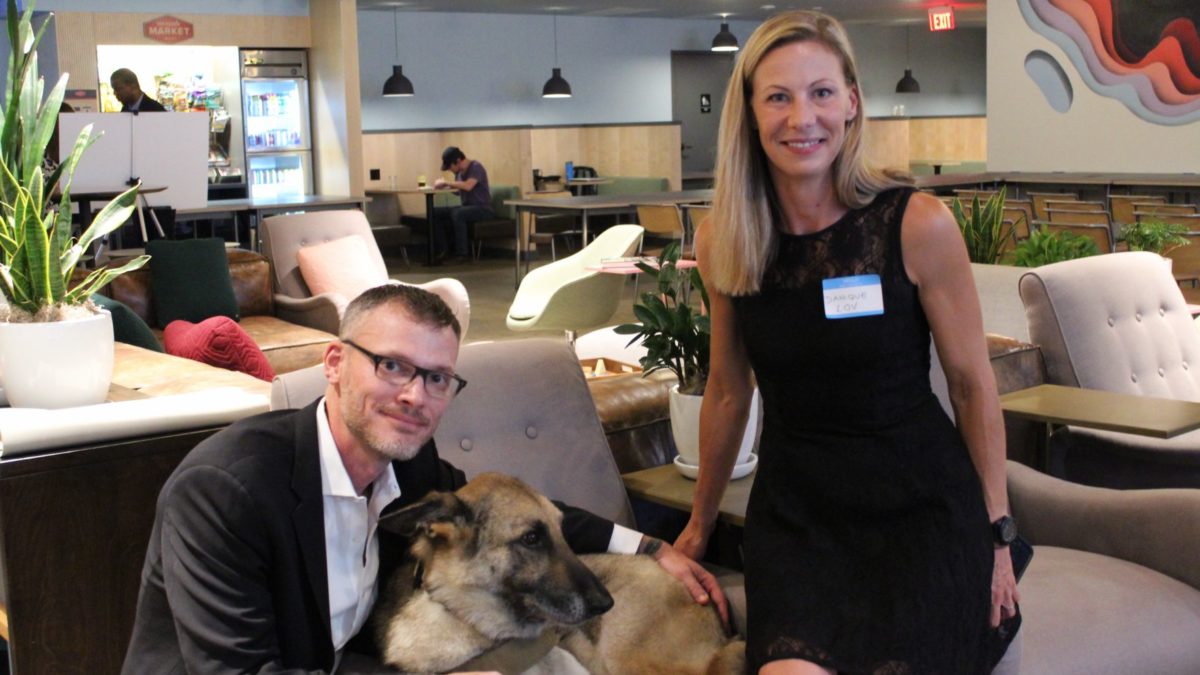The award-winning 17th century-style Shofuso Japanese House and Garden is celebrating its 60th anniversary. Located in West Fairmount Park, the historic landmark recently unveiled new programming and art installations.
All are welcome, except, that is, service animals in the house portion of Shofuso.
On the Japan America Society of Greater Philadelphia’s website, under the Frequently Asked Questions, it states that animals are not allowed at Shofuso Japanese House and Garden and service animals are only allowed in the garden.
The website’s statement reads:
“Pets are not allowed at Shofuso; service animals who have been trained to work or perform certain tasks are allowed. Due to the historic nature of the house, service animals are only permitted in the garden. For more information, please see Title II of the [Americans with Disabilities Act] ADA.”
Upon review, the ADA Title II does not clarify, explain or explicitly justify the reasoning for the partial exclusion of service animals.
Title II of the ADA states: “Access to areas of a public entity.Individuals with disabilities shall be permitted to be accompanied by their service animals in all areas of a public entity’s facilities where members of the public, participants in services, programs or activities, or invitees, as relevant, are allowed to go.”
This is not to be confused with therapy or emotional support animals, which are not considered service animals and protected as such under federal law. Currently, the ADA states that service animals may only be dogs, with an occasional exception of miniature horses.
In terms of permissible exemptions, a public entity may only ask a person to remove their service animal from the premises if “(1) The animal is out of control and the animal’s handler does not take effective action to control it; or (2) The animal is not housebroken.”
“We certainly want to make the historic house and site available to everyone, said Kim Andrews, executive director of Japan America Society of Greater Philadelphia. “As we understand, having service animals inside the house, because the actual materials inside the house, would be damaged by the claws. We have the tamei matts and wood. We have guides that are available to walk around the house. Ninety-five percent of the house is visible, literally visible from outside the house in the garden.”
Andrews said she made the service animal rule upon joining the organization in 2010. When asked, Andrews said she did not receive outside consultation before making the decision. Instead, she explained it was from her reading of the ADA’s policies on service animals as well as its section on historic preservation.
While the ADA’s section on “Existing Facilities” does exempt public entities from “any action that would threaten or destroy the historic significance of an historic property,” the section is primarily discussing the physical changes needed to an existing space to make it ADA compliant.
Neither the ADA’s section on historic preservation nor the section on service animals directly mentions the other.
“Designation as an ‘historic landmark’ does not automatically permit Shofuso Japanese House and Garden to exclude service animals,” Communications Director Rachel Hooper of the Philadelphia Commission on Human Relations and Fair Housing Commission explained to PW in an email correspondence.
The Pennsylvania Human Rights Commission (PHRC) states similar language to the ADA, underscoring the illegal nature to discriminate against those using a service animal.
In a PHRC document, it reads:
“In Pennsylvania you have the right to live, work, and learn free from illegal discrimination. Under the Pennsylvania Human Relations Act, it is illegal to discriminate against individuals who use support or guide animals for a disability, or against trainers or handlers of support or guide animals. Many people with disabilities need support animals to perform their jobs or basic life tasks.”
According to the Pennsylvania Human Relations Act, Philadelphia is one of the municipalities that have enacted local laws that govern certain types of service animal access.
However, Hooper explained that as a private nonprofit, Shofuso’s service animal access would fall under the federal ADA regulation.
“The ADA requires State and local government agencies, businesses, and nonprofit organizations (covered entities) that provide goods or services to the public to make ‘reasonable modifications’ in their policies, practices, or procedures when necessary to accommodate people with disabilities,” said Hooper. “Shofuso Japanese House and Garden is a private nonprofit that provides goods or services to the public, The service animal rules fall under this general principle. Accordingly, entities that have a ‘no pets’ policy generally must modify the policy to allow service animals into their facilities.”
The ADA’s FAQ states that “If admitting service animals would fundamentally alter the nature of a service or program, service animals may be prohibited.” It then clarifies that “In most settings, the presence of a service animal will not result in a fundamental alteration. However, there are some exceptions.”
The following examples of “exceptions” listed in the FAQ refer to safety and programming, but not to the physical structure of a building:
“For example, at a boarding school, service animals could be restricted from a specific area of a dormitory reserved specifically for students with allergies to dog dander. At a zoo, service animals can be restricted from areas where the animals on display are the natural prey or natural predators of dogs, where the presence of a dog would be disruptive, causing the displayed animals to behave aggressively or become agitated. They cannot be restricted from other areas of the zoo.”
There is “definitely a gray area,” said Danique Masingill, co-founder and president of Leashes of Valor that provides service animals to war veterans, free of cost.
A U.S. Navy veteran, Masingill argued that a major setback in service animal acceptance is the lack of regulation that allows for discriminatory loopholes as well as people to abuse the system, posing pets as service animals and purchasing false identification badges and vests.
Under the ADA, service animals do not require certification, documentation, a badge or a vest. When it is not clear whether a dog is in fact a service animal, employees may only ask two questions: “(1) is the dog a service animal required because of a disability? and (2) what work or task has the dog been trained to perform?” Any further inquiry could violate a person’s right to privacy about their health.
An individual may train their own service animal, but the dog must be able to perform “tasks” that directly relate to a person’s disability. On one hand, this creates more equitable access for those who cannot afford service dog training, purchase an already trained service dog or wait for a nonprofit to match them with a subsidized or free dog. On the other hand, the process forfeits standardization without the requirement of federally supervised training organizations.
Masingill explained that spaces, such as grocery markets and airports, have taken on additional protocols to deter service animal fraud: “These additional stipulations are sometimes necessary and currently due to the amount of fraud in the service dog space, the burden of proof for legitimacy lies with the handler.”
Masingill’s partner at Leashes of Valor, Executive Chief Officer Jason Haag, knows firsthand about service animal discrimination.
Haag made national headlines in 2015 when American Airlines refused him and his service dog, Axel, from boarding a flight. Even though Haag had abided by the airline’s rules, which differ from federal law, he was still accused of trying to pass off a pet as a service animal.
Haag is a Marine Corps veteran who was wounded in action. Dealing with severe post-traumatic stress disorder (PTSD) and traumatic brain injury (TBI), the Purple Heart recipient received Axel from K9s for Warriors. They were on their way home to Virginia after attending the American Humane Association Hero Dog Award ceremony in California, where Axel was named winner of the Service Dog category. American Airlines issued an apology after reviewing the matter.
“Axel saved my life,” Haag said during the launch event of Leashes of Valor’s newly formed Philly group at WeWork at 1900 Market St. back in September. The former Camp Pendleton Marine captain revealed he dealt with violent flashbacks and outbursts, was on a number of medications and had a drinking problem that was creating an unsafe situation for himself as well as wife and children. Haag referred to Axel as a “medical device,” trained to, among other tasks, lick, pull or even intentionally bite Haag during blackout flashbacks that can occur at home and in public.
As a national landmark, Shofuso is not alone in its stance against full-access to service animals, according to Masingill.
“I have experienced ‘push-back’ at certain historical sights, especially battlefields and coinciding cemeteries or burial grounds,” said Masingill. “It is an additional conversation to ensure the area is treated with respect.”
From PW’s review of some of Philadelphia’s other historic places’ website, none shared Shofuso’s explicit clause denying access to service animals. However, exact language varied on public websites and some did not refer to service animals at all.
The Independence National Historical Park includes a general statement of inclusion that “Service animals are permitted in all park buildings.” The Rodin Museum’s website does not directly mention service animals on its homepage, but it is included in the Philadelphia Museum of Art‘s overall policy: “Service dogs are permitted in the building. They must obey the same policies as all other visitors.”
Another museum, but not under the historic registrar, the Barnes Foundation, made sure to publicize that service animals must be “well-behaved” if they are to be welcome – a stipulation already established under the ADA.
Andrews clarified about the Japanese house in a subsequent email that “The preservation requirements of Shofuso are much more stringent than those of other historic sites in the city because of the nature of these materials.”
“To preserve the flooring, we do not put chairs, tables, signs, or any other objects directly on any of the floor surfaces because they are so easily gouged, scratched, and damaged. We also sweep the flooring multiple times throughout each day to eliminate any debris that could damage the floors,” said Andrews of the precautionary measures taken for the preservation of the space.
Andrews also explained that visitors must wear socks or peds before entering the house.
“Guests who step from the veranda into the garden in their socks must return to the house entrance and replace their socks or peds with fresh ones to prevent damage to the flooring,” she wrote.
At the Subaru Cherry Blossom Festival of Greater Philadelphia festival in April, PW noticed this rule was not strictly enforced with some visitors going barefoot, wearing their own dirty socks and a few even wearing shoes.
During the original interview with Andrews, specific questions went unanswered about possible alternatives to ensure no damage would be done to the infrastructure, such as a requirement for service animals to wear dog booties or having paw grooming inspection before entering the house portion.
Andrews said she would be willing to change or modify the policy if it needed to comply with the law.
TWITTER: @ANDREAJCANTOR
Correction: Nov. 9, 2018
An earlier version of this article incorrectly cited the Rodin Museum in Philadelphia with the Rodin Museum in France.





